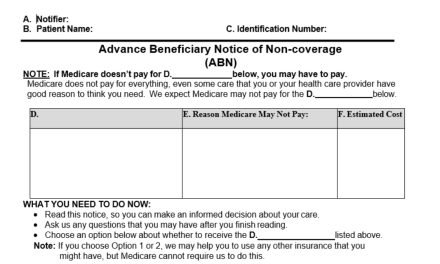
Is Your Radiologist Licensed in Illinois?

Doctors: Do you use your in-office x-ray equipment to perform patient imaging studies and send the images to an outside radiologist for reading and interpretation? If so, the Illinois Medical Practice Act requires that the radiologist possess an Illinois physician license, whether the radiologist is located inside or outside of Illinois.
Many Illinois physicians mistakenly believe that out-of-state radiologists are authorized to interpret films of patients in Illinois, so long as the radiologist is licensed in his or her state. However, the law of the patient’s location will control in these cases; thus, Illinois law applies to patients you see in your office, and the reading radiologist needs an Illinois license.
The Illinois Department of Financial and Professional Regulation (IDFPR) can and has issued orders to cease and desist to out-of-state radiologists who lack Illinois licensure and interpret imaging studies of Illinois patients. This activity is considered the unlicensed practice of medicine in Illinois, regardless of whether the radiologists are licensed in their own jurisdictions.
In addition to issuing Cease and Desist Orders against the out-of-state radiologists, the IDFPR also has investigated and disciplined the licenses of Illinois physicians who used out-of-state radiologists who are not licensed in Illinois. The IDFPR considers the Illinois doctor to be aiding and abetting the unlicensed practice of medicine, as explained below.
Important: Any radiologist who performs a review of your x-rays MUST have an Illinois license, and you can be held responsible when they do not.
Illinois Law
Section 49 of the Medical Practice Act defines the practice of medicine by listing services that may be performed only by Illinois licensed physicians. The Illinois Medical Practice Act applies whenever the patient is located in Illinois, and, under Section 49, diagnosis of an ailment or injury is the first item listed. Any person who reads and interprets an Illinois patient’s imaging study must have an Illinois license, because this activity is diagnosing of a patient in Illinois. In this way, Illinois’ General Assembly has ensured that all health care providers who diagnose Illinois patients meet consistent licensing qualifications.
When an Illinois licensed physician transmits an image to, and requests a diagnosis from, a non-Illinois licensed provider, the IDFPR considers the Illinois physician to be aiding and abetting the out-of-state physician in the unlicensed practice of medicine in Illinois. This conduct violates the Medical Practice Act and subjects the Illinois physician’s license to disciplinary action. The fact that the out-of-state doctor may be fully licensed in his or her jurisdiction, or be board certified, or otherwise eminently qualified, does not relieve the requirement for an Illinois license. And, though the IDFPR may consider proficiency as a mitigating factor, it does not consider it to be a defense to an “aiding and abetting” charge against the referring doctor.
Electronic Transmission Does Not Change the License Requirement
This license requirement applies regardless of the method of image transmission, i.e., whether the Illinois physician sends the imaging electronically (via computer) or via hard copy sent by mail or other courier. The only exceptions are found in Section 49.5 of the Medical Practice Act.
Section 49.5 of the Act permits four limited exceptions to the license requirement for out-of-state doctors who provide services for Illinois patients:
- periodic consultations between a person licensed under this Act and a person outside the State of Illinois; i.e., an Illinois licensed physician who retains full responsibility for diagnosis and treatment of the patient is permitted to periodically confer with outside persons for additional information in assessing diagnosis and appropriate therapies;
- a second opinion provided to a person licensed under this Act. This is the most commonly relied-on exception, used when the examining Illinois in-office physician makes the primary interpretation and diagnosis and seeks confirmation in a “second opinion” from another doctor. it is especially important that you carefully document your initial opinion when you requesting an opinion of a doctor who is not licensed in Illinois.
- diagnosis or treatment services provided to a patient in Illinois following care or treatment originally provided to the patient in the state in which the provider is licensed to practice medicine; i.e., a patient who moves to Illinois from another state while under diagnosis and care in the other state for a specific condition; and
- health care services provided to an existing patient while the person licensed under this Act or patient is traveling; for example, for existing patients of Illinois doctors, the Act does not consider it to be unlicensed practice for the Illinois doctor to refer a patient, visiting in another state, to a doctor in that state to follow up on an existing condition.
The most commonly relied-on exception is the “second opinion” listed in number 2 above. Generally, it is allowable for you to perform the primary interpretation of your patient’s films and consult with an out-of-state doctor for a confirming “second opinion.” For this reason, if you intend to seek a second opinion from a non-Illinois licensed physician, it is especially important that you document your conclusions in the patient record before sending the records to the other physician for review.
Unfortunately, some physicians have been unaware of these requirements until they received notices of disciplinary investigation from the DFPR. Instead, the ICS recommends that you obtain the name or names of your out-of-state radiologists and perform a simple check for licensure on the IDFPR website (www.idfpr.illinois.gov) You will avoid problems by using only Illinois licensees for primary interpretations, or by limiting your use of non-Illinois licensees to second opinions.



















